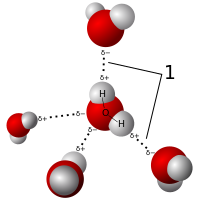
Photo from wikipedia
Fast-field-cycling (FFC) NMR is a technique that can probe the longitudinal nuclear magnetic relaxation dispersion (NMRD) profiles by varying the magnetic field to a large extent. This allows probing the… Click to show full abstract
Fast-field-cycling (FFC) NMR is a technique that can probe the longitudinal nuclear magnetic relaxation dispersion (NMRD) profiles by varying the magnetic field to a large extent. This allows probing the molecular dynamics of complex fluids in confinement. In this paper, the NMRD profiles of saturating water and oil (dodecane) in conventional and unconventional reservoir sandstone rocks are interpreted with a proposed model. In contrast to conventional transverse relaxation studies, the FFC-NMR technique shows very different dynamics and wettability of these two petroleum fluids at the pore surfaces of reservoir rocks clearly. Though there is still no direct technology for in situ probing of the wettability of formation rocks, the FFC-NMR technique showed a potential prospect in the petroleum industry for probing the wettability of continental depositional or interactive marine and continental depositional sandstones.
Journal Title: Energy & Fuels
Year Published: 2019
Link to full text (if available)
Share on Social Media: Sign Up to like & get
recommendations!